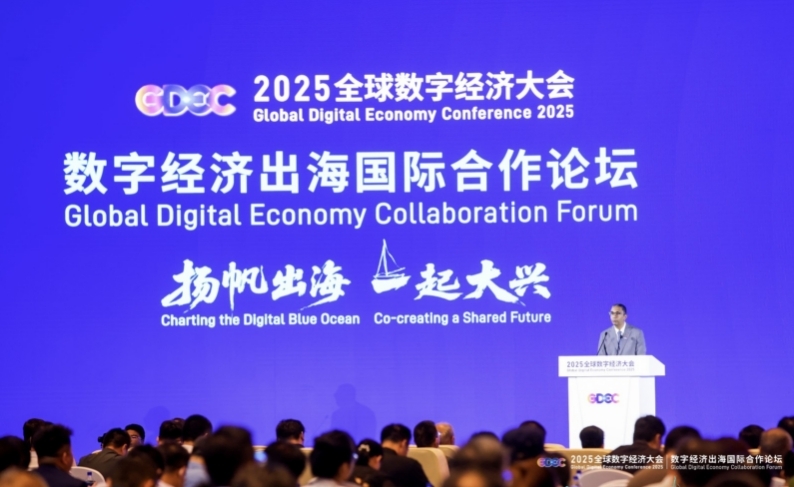By Wu Siya
BEIJING, July. 4 (China Economic Net) – "The question is not whether global digital transformation will continue, but whether we can ensure its benefits are inclusive, equitable, and accessible to all," UNDP Deputy Resident Representative in China, James George, delivered opening remarks at the Global Digital Economy Conference 2025 held in Beijing on July 3.

James George delivered opening remarks at the GDEC 2025 [Photo/GDEC]
The representative noted that UNDP together with our sister UN agencies and development partners, we have long worked at the intersection of digital innovation and sustainable development-supporting efforts ranging from inclusive digital policies to digital public infrastructure, from smart city diagnostics to responsible data governance.
"Today, I am proud to announce that we will officially sign the UNDP Demonstration Project on Digital-Friendly and Digital Economy for Sustainable Development in Beijing, together with our project partners: Beijing Municipal Bureau of Economy and Information Technology, the People's Government of Daxing District, and the China International Center for Economic and Technical Exchanges (CICETE)," George added. "Just as importantly, it will contribute to global knowledge-sharing-connecting local practice with international dialogue on what works and lessons learned."
Digital Silk Road is connecting the world. China is becoming increasingly connected with other countries, especially the countries along the Belt and Road Initiative, in the field of digital economy. "The digital economy is becoming an important tool for realizing the national sovereign development strategy. In order to fully unleash the potential of the digital economy, Nicaragua has formulated and implemented the National Digital Transformation Plan, which includes the active participation of Chinese companies and uses Chinese technology to enhance our connectivity, digital services, technological innovation and talent training capabilities," noted Ramio Jose Cruz Flores, Nicaraguan ambassador to China, who is full of confidence in the prospects for digital cooperation between the two countries.
It is reported that the China-Nicaragua Free Trade Agreement, which will officially take effect on January 1, 2024, has opened up new space for the two countries in e-commerce and digital services. Encouraging more Nicaraguan students to come to China to study cutting-edge technologies such as AI, cloud computing, and big data is also in Nicaragua's national strategic plan.
"As artificial intelligence has developed to this day, the potential of scenarios and data resources it brings to various fields of the digital economy is unlimited," said Yu Xiaohui, President of China Academy of Information and Communications Technology (CAICT). "The export or open source of digital technology to achieve inclusive development is our vital foundation. We have established the BRICS Artificial Intelligence Development and Cooperation Center to fully promote the export of Chinese technology as well as combine it with global development needs. Soon, we are going to release a development index to boost the specific application of AI technology in various countries and regions."
Beijing has taken the lead in exploring international cooperation in the digital economy at the city level by establishing digital economy partnerships with 27 cities worldwide, including but not limited to Abu Dhabi, Busan, Colombo, London, Copenhagen, San Francisco, Johannesburg. In 2024, the city's digital economy growth value has exceeded 2.2 trillion yuan, with more than 2,400 artificial intelligence companies, and the core industry revenue has exceeded 300 billion yuan.
(Editor: liaoyifan )


